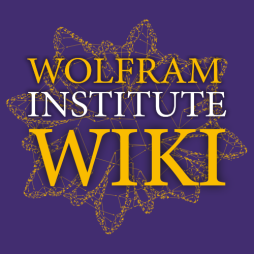Welcome: Difference between revisions
No edit summary |
No edit summary |
||
| (19 intermediate revisions by 2 users not shown) | |||
| Line 1: | Line 1: | ||
= Welcome to the Wolfram Institute Wiki = | |||
[[File:Wolfram-institute-wiki-icon.png |right|254x254px|alt=Wolfram Institute Wiki]]'''The Wolfram Institute for [[Computational Foundations]] of Science''' is dedicated to the study of the simple computational rules that underlie the complexity of scientific phenomena—and to understanding how the universe, and science itself, emerges from them. | |||
This is the official wiki of the Institute, where you’ll find documentation, research notes, technical references, and collaborative work on our computational frameworks and initiatives. | |||
== | == Trending Pages == | ||
* [ | |||
* [ | * [[Computational Foundations]] | ||
* [ | * [[Fundamental Physics]] | ||
* [ | * [[Wolfram Model]] | ||
* [https:// | * [[Perturbed Cellular Automaton]] | ||
== Research Areas == | |||
We pursue a range of fields that explore the computational universe and its implications for fundamental science. This multidisciplinary approach fosters innovation and drives new understanding of the underlying structures of reality. | |||
* [[Fundamental Physics]] | |||
* [[Biology]] | |||
* [[Mathematics]] | |||
* [[Machine Learning]] | |||
* [[Philosophy]] | |||
* [[Computer Science]] | |||
== 🔬 Latest Research == | |||
<rss max="10">https://wolframinstitute.org/output?format=rss</rss> | |||
---- | |||
''This wiki is a living document — continually evolving as our research progresses.'' | |||
Feel free to explore, contribute, and collaborate! | |||
Latest revision as of 15:05, 20 August 2025
Welcome to the Wolfram Institute Wiki

The Wolfram Institute for Computational Foundations of Science is dedicated to the study of the simple computational rules that underlie the complexity of scientific phenomena—and to understanding how the universe, and science itself, emerges from them.
This is the official wiki of the Institute, where you’ll find documentation, research notes, technical references, and collaborative work on our computational frameworks and initiatives.
Trending Pages
Research Areas
We pursue a range of fields that explore the computational universe and its implications for fundamental science. This multidisciplinary approach fosters innovation and drives new understanding of the underlying structures of reality.
🔬 Latest Research
- Quantum Operators From Wolfram Model Multiway Systems
- Furkan Semih Dündar, 2026-01-21 19:17:48
- What Is Ruliology?
- Stephen Wolfram, 2026-01-13 03:30:32
- Quantum Gates from Wolfram Model Multiway Rewriting Systems
- Furkan Semih Dündar, 2025-12-27 17:33:24
- What’s Special about Life? Bulk Orchestration and the Rulial Ensemble in Biology and Beyond
- Stephen Wolfram, 2025-11-11 18:21:00
- Quantum Gravity and Computation: Information, Pregeometry, and Digital Physics
- Xerxes D. Arsiwalla, 2025-11-10 17:55:03
- Upper Bounds on the Chromatic Index of Linear Hypergraphs
- Thomas Murff, 2025-10-25 19:55:06
- The Ruliology of Lambdas
- Stephen Wolfram, 2025-09-17 16:49:32
- Human Language and Machine Language
- Christopher Lord, 2025-08-18 18:58:46
- “I Have a Theory Too”: The Challenge and Opportunity of Avocational Science
- Stephen Wolfram, 2025-08-15 03:19:40
- Towards a Theory for the Speed of Biological Evolution
- Willem Nielsen, 2025-08-12 04:40:36
This wiki is a living document — continually evolving as our research progresses. Feel free to explore, contribute, and collaborate!